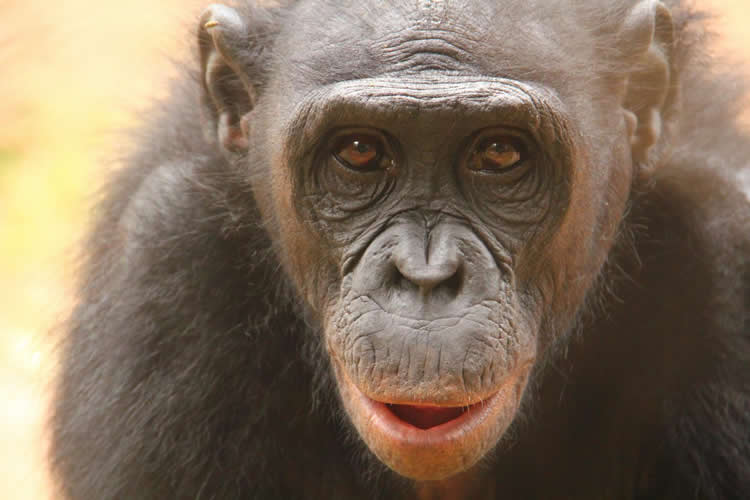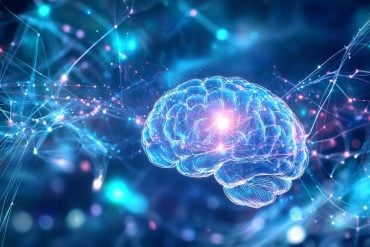Summary: Researchers report bonobos express disgust when presented with contaminated food. The study reveals their curiosity transforms into caution when food is presented near feces or a bad smell.
Source: Kyoto University.
Even bonobos lose their appetites with enough ‘ick’.
These primates, known for their liberal attitudes toward sex, are also generally open-minded when it comes to new foods — as long as the grub is clean.
Researchers from Kyoto University’s Primate Research Institute have now found that a bonobo’s curiosity transforms into caution when food is presented with or near feces, soil, or bad smells. Their study was published in the journal Philosophical Transactions of the Royal Society B.
In nature, parasites and pathogens are everywhere, and many enter our bodies by riding along with food. We therefore need a way to detect these hitchhikers with the help of our various senses.
“Current studies suggest that animals evolved a system to protect against such threats, now known as the adaptive system of disgust,” explains Cecile Sarabian, lead author of the study. “For example, bodily fluids are universal disgust elicitors in humans, and recently, we published evidence that the same reaction exists in our primate cousins.”
In a series of experiments, bonobos were presented with different food choices involving novel food items: foods contaminated with feces or soil; chains of food items linked to a contaminant; previously contaminated food; or only the odors of feces or rotting food.
Although bonobos happily gobbled up clean food, they steadfastly avoided anything contaminated. Moreover, their sensitivity toward contamination risk seemed to wane the farther away a food item was located from the source of contamination.
Another experiment showed that bonobos are less likely to engage in exploratory activities like touching and tasting substrates, or even using tools to achieve a goal when confronted with ‘bad’ smells.
“These results fit with what one would expect if bonobos had a system of disgust driving their behavioral decision making,” says Sarabian. “Interestingly though, bonobo infants and juveniles showed much less precaution, matching human infant behavior in similar contexts.”
One hypothesis they have is that while infants may get sick from this kind of behavior, it helps them build their immune systems at a critical time in their development.

The team has yet to conclude if bonobos themselves express disgust in a way we can recognize, but plan to continue their research and further investigate the origins of disgust in humans.
“There’s some evidence from humans and other animals — classically with rats — on what we call food neophobia, which is an inclination to stay away from or be cautious around new foods,” adds senior author Andrew MacIntosh. “This might also be related to our tendencies to avoid things that might make us sick, with different individuals being more or less conservative in both cases.”
“In our study, the bonobos seemed eager to tuck into novel fruits, which tells us that they are not very food-neophobic, or at least they automatically associate fruits they’ve never seen before with food,” MacIntosh continues. “But we need more information about how they might react to a range of new foods before we can try to link food-neophobia with contamination sensitivity in other primates.”
Funding: Kyoto University, Japan Society for the Promotion of Science funded this study.
Source: Raymond Kunikane Terhune – Kyoto University
Publisher: Organized by NeuroscienceNews.com.
Image Source: NeuroscienceNews.com image is credited to Kyoto University / Cecile Sarabian.
Original Research: Abstract for “Feeding decisions under contamination risk in bonobos” by Cecile Sarabian, Raphael Belais, and Andrew J. J. MacIntosh in Philosophical Transactions of the Royal Society B. Published June 4 2018.
doi:10.1098/rstb.2017.0195
[cbtabs][cbtab title=”MLA”]Kyoto University “A Sense of Disgust in Bonobos?.” NeuroscienceNews. NeuroscienceNews, 4 June 2018.
<https://neurosciencenews.com/bonobo-disgust-9237/>.[/cbtab][cbtab title=”APA”]Kyoto University (2018, June 4). A Sense of Disgust in Bonobos?. NeuroscienceNews. Retrieved June 4, 2018 from https://neurosciencenews.com/bonobo-disgust-9237/[/cbtab][cbtab title=”Chicago”]Kyoto University “A Sense of Disgust in Bonobos?.” https://neurosciencenews.com/bonobo-disgust-9237/ (accessed June 4, 2018).[/cbtab][/cbtabs]
Abstract
Feeding decisions under contamination risk in bonobos
Threats from parasites and pathogens are ubiquitous, and many use pathways that exploit host trophic interactions for their transmission. As such, host organisms have evolved a behavioural immune system to facilitate contamination-risk assessment and avoidance of potential contaminants in various contexts, including feeding. Detecting pathogen threats can rely on different sensory modalities allowing animals to screen for a wide array of contaminants. Here, we present a series of experiments in which bonobos showed clear avoidance of contaminated food items, and were sensitive to risk along a contamination probability gradient. Across experiments, bonobos appeared to use multisensorial cues to inform their feeding decisions. In addition, bonobos showed reduced tactile, gustatory and tool use activities when in the presence of contaminant versus control odours in a challenging foraging context. Our experiments build on previous work conducted in Japanese macaques and chimpanzees aiming at a better understanding of the ways in which the behavioural immune system operates in primates.






